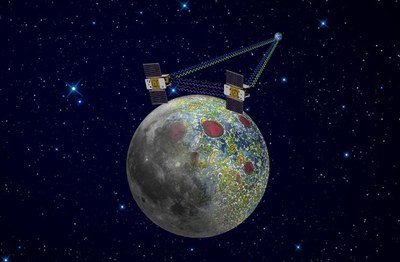Wanted: better spacecraft namesby Jeff Brooks
|
| Rather than evoke the wonder and excitement of exploration or a sense of national pride, these spacecraft names seem designed to elicit a chorus of yawns. |
Years ago, NASA generally named its spacecraft in two different fashions. Some were christened with names that evoked the sublime wonders of exploration and discovery in general, such as Mariner, Pioneer, Viking, and Voyager. Other spacecraft were given names that honored great explorers and scientists, such as Magellan, Galileo, and Cassini-Huygens. These names resonated with the public and contributed to the development of a positive opinion of space exploration.
These days, however, many of the names given to our spacecraft fail to evoke much of anything. Quite a few spacecraft names are just plain boring, such as that of the Mars Reconnaissance Orbiter. Other names seem to have little to do with the mission itself, such as that of the Dawn mission to the asteroid belt; saying that the scientific goal is to shed light on the “dawn” of the solar system is stretching things, to say the least. Still other names are silly acronyms tortuously put together with mundane, technical words, such as the recently-launched Gravity Recovery And Interior Laboratory (GRAIL). Finally, we have a few names that simply make no sense at all, like that of the New Horizons mission to Pluto. Rather than evoke the wonder and excitement of exploration or a sense of national pride, these names seem designed to elicit a chorus of yawns.
The Mars Reconnaissance Orbiter, Dawn, GRAIL, and New Horizons are all fascinating and worthwhile projects, well deserving of popular support and public funding. This would be true no matter what names they were given. But the very first thing an ordinary citizen hears about a space exploration project is its name, and giving a spacecraft a name is either boring or confusing makes for a bad first impression.
When James Cook explored the South Pacific in the late 18th century, he did so in ships called Endeavour, Adventure, Resolution, and Discovery. His expeditions caught the imagination of the British public, with innumerable schoolboys eagerly devouring books about Cook’s exploits and dreaming of one day becoming explorers themselves. I doubt the British public would have followed his expeditions quite so closely if his ships had had names like Venus Transit Survey Vessel or Island Locator Made Of Wood (ILMOW).
To be fair, some of the names recently given to spacecraft are not all that bad. The Juno mission to Jupiter is aptly named, as Juno was the wife of Jupiter and, on a memorable occasion, used her divine powers to penetrate the magical clouds behind which Jupiter had hid himself. Curiosity, while it wouldn’t have been my first choice, seems an fairly appropriate name for the Mars rover that is due to launch later this year, as it speaks to one of the fundamental human qualities that makes us explorers.
| When it comes to naming spacecraft, NASA needs to get back to selecting names that evoke the spirit of discovery or that honor the heroes of the history of science and exploration. |
On occasion, NASA has held student essay contests in order to select the names of missions, which was how the Mars rovers Spirit and Opportunity got their names. Like many space enthusiasts, I have grown to love these plucky little robots as I’ve followed their adventures on the Red Planet, but I still don’t really see what their names have to do with either exploration in general or Mars in particular. At the time the names were announced, it struck me that two robotic rovers exploring the same world at the same time might have fittingly been named the Meriwether Lewis and the William Clark.
There is virtually an inexhaustible supply of potential names to be drawn from the history of exploration and discovery, the history of science, and the mythologies of many cultures, any one of which would speak to the deeper and more fundamental motives for space exploration better than most of the names we give our spacecraft these days. Whenever we finally get around to launching a dedicated mission to Europa to examine its subsurface ocean, instead of giving it a dull name like Europa Ocean Explorer, why not name it Poseidon after the Greek god of the seas? Future missions to Mars can easily draw upon dozens of different war gods from various mythologies, such as Segomo of the Gauls, Tohil of the Maya, or Nergal of the Babylonians. And when will a space mission be named after Tycho Brahe, or Leonardo da Vinci, or Alexander von Humboldt?
When it comes to naming spacecraft, NASA needs to get back to selecting names that evoke the spirit of discovery or that honor the heroes of the history of science and exploration. The public, and more importantly the media, are drawn to these names in a way they simply are not drawn to the boring, confusing, and often simply silly names that NASA has been bestowing upon its spacecraft in recent years. This may seem like a small issue, but I believe it is more important than people realize. And even if it is a minor issue, it’s clearly one of the small steps toward cultivating a positive public perception of space exploration that NASA needs to take.
